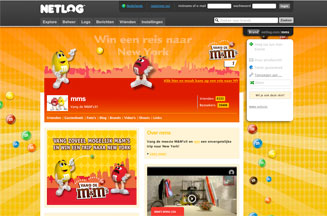
With Facebook's popularity now seemingly transcending all demographic divides, the social network has, arguably, started to lose its cool with young people. Ready in the wings to fill this gap is Netlog, a social portal for 'the European youth', which is attempting to crack the UK market.
The site positions itself as a community site for teens interested in playing online games, listening to music, watching video and chatting to their friends online. More than 80% of its members fall into the 14- to 25-year-old age group.
Netlog has 51m members worldwide, and has already taken its home market of Belgium, as well as those of Italy and Switzerland, by storm. By comparison, its efforts in the UK, where its unique monthly user numbers are actually falling, have been rather muted. It had fewer than 300,000 in July, down 36% year on year, according to comScore. Also in July, Netlog was only the 57th most-visited social networking site in the UK, according to Hitwise.
Despite this, Netlog is embarking on a UK sales offensive, approaching both agencies and brands itself, as well as through sales house Unanimis, which it appointed last year to build up its European advertising income. Pieterjan Bouten, business development manager of Netlog Europe, says: 'We are trying to get our name out there in the UK and we are telling brands about the unique opportunities that we offer.'
Bouten claims this interest from young web users across Europe makes the site of significant value to brands that want to run pan-European activity. The European Commission is using the site to promote its 'HELP' anti-smoking campaign to teenagers in the 27 EU member states, driving them to a dedicated microsite to help them quit smoking or resist peer pressure.
The UK has been a difficult nut to crack, according to Bouten, because in other countries Netlog had the advantage of launching in local languages. 'In the UK, we don't have that advantage and there is more competition.'
The site's recent launch of a games channel is expected to help grow its UK user base with casual gamers. The site also enables advertisers to launch branded games. For example, Quick, Belgium's answer to McDonald's, is developing a game for the site promoting its 'Long burgers'. Bouten says the games are 'premium content' and a major point of difference for Netlog.
Netlog aims to be a 'more open community' than its rivals and integrates other platforms, such as Twitter, so that updates can be published on a Netlog profile. 'On Facebook you connect with your friends, but on Netlog you connect with like-minded people you might not know already,' says Bouten. 'People say what makes Netlog different from others is that it is a more lively community.'
Netlog users can customise their profile pages with personal photos, videos, Delicious bookmarks and status 'shouts'. Users can also choose branded skins for their profiles, such as those for M&M's and Snickers, effectively making users brand ambassadors.
In addition, brands can take creative display ads such as a homepage take-over for a film release, such as Warner Bros' campaign for Batman: The Dark Knight. Others have opted for micro-sites and online applications, such as Samsung's 'Wow Moments' photo- and video-sharing app or Heineken's 'Know the signs'. The latter pair have, however, attracted only about 1000 Netlog users.
Nathan McDonald, managing partner of social media agency We Are Social, says there is potential appeal in Netlog for UK brands and users as the site is a 'fairly slick package' that combines Facebook-style branded fan pages and the community elements of MySpace. 'Users are loyal to the sites their friends use, but as the mums move to Facebook, young people want to have their own community,' he adds.
Netlog is not yet showing any signs of filling that void among the UK's social networkers, however. Moreover, without evidence of the site gaining momentum outside its European strongholds, UK brands are unlikely to ditch the more popular social networks from their campaigns just yet.

